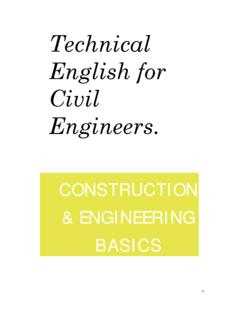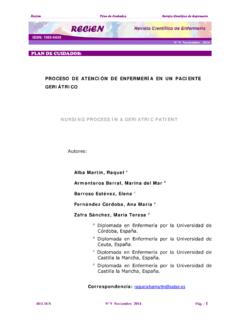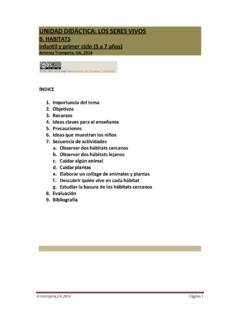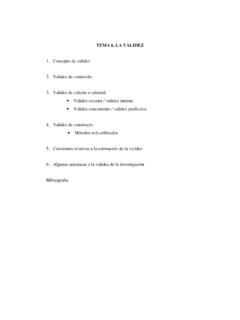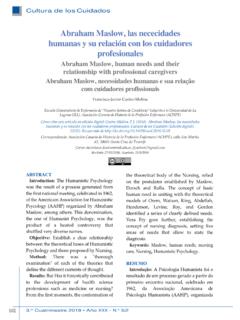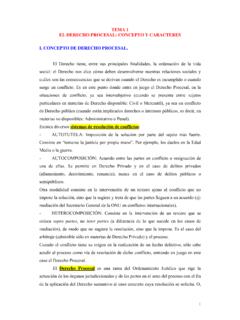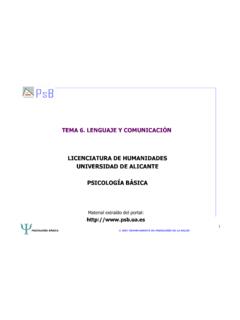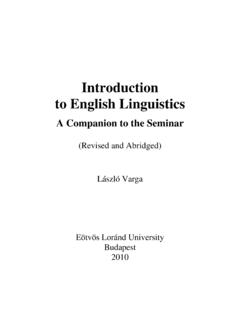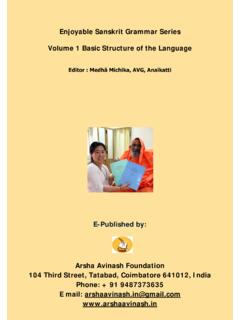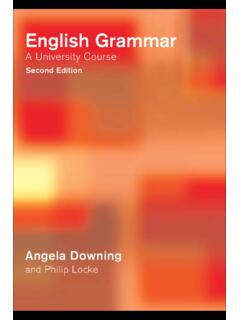Transcription of The structure of the English Sentence
1 Manuel Palaz n & Marian Aleson M ster Dir. Emp. Tur, GRAMMAR The structure of the English Sentence In this first part of the grammar you are going to review the most common structures in English . In addition, you will study some structures that differ from the normal syntactic order. We will review some of the things that you have studied in previous years. basic syntax in English = The order of the normal Sentence in English .
2 The structure of questions = Questions are an inversion of the normal Sentence order. Inversions = Sentences that use inversions to emphasize a part of the Sentence . Manuel Palaz n & Marian Aleson M ster Dir. Emp. Tur, GRAMMAR basic syntax in English When writing in a foreign language it is important to know and to review the order of the words in the sentences we make. Many times we translate directly form our native language and we do not notice that the order of elements is not necessarily the same.
3 One of the main differences between the Romance and the Germanic languages is based on the versatility of the former in the order of the words in the Sentence . Declinations allow a wide range of syntactic structures, whereas in English , for instance, subjects and verbs should be closed together or otherwise it would be impossible to understand the sentences. BASIC SYNTACTIC ORDER: That is the most common. It is employed in affirmative and negative sentences. SIMPLE Sentence One Conjugated Verb A) SUBJECT + VERB + COMPLEMENTS I am (not) very happy B) SUBJECT + AUXILIARY VERB + VERB + COMPLEMENTS I have (not) been in England before COMPOUND Sentence A)SUBJECT+VERB+COMPLEMENTS+CONJUNC.
4 +SUBJEC +VERB+COMPLEMENTS You are the student whose exam was lost last year Questions are a type of inversion. The inversion allows the hearer to understand that it is a question. QUESTIONS: An inversion in the syntactic structure shows the interrogative aspect of the Sentence . SIMPLE Sentence One Conjugated Verb A) VERB + SUBJECT + COMPLEMENTS Am I (not) very happy ? B) AUXILIARY VERB + SUBJECT + VERB + COMPLEMENTS Have I (not) been in England ?
5 C) INT. PRONOUN+AUXILIARY VERB + SUBJECT + VERB +PREP? What are you waiting for? COMPOUND Sentence A) VERB+SUBJECT +COMPLEMENTS +CONJUNC.+SUBJEC +VERB+COMPLEMENTS Are you the student whose exam was lost last year ? Manuel Palaz n & Marian Aleson M ster Dir. Emp. Tur, GRAMMAR The interrogative pronouns will always have a function in the Sentence .
6 INTERROGATIVE PRONOUNS SUBJECT WHO - WHAT - WHICH ADVERB WHEN - WHY - HOW OBJECT WHICH - WHOM (WHO) POSSESSIVE WHOSE You should be able to distinguish between: QUESTIONS: Different functions of the interrogative pronoun Pronoun as subject Who invited you to the party? => Somebody invited you to the party Pronoun as Subject + verb + objects ? There is no inversion because the subject (the interrogative pronoun) cannot follow the verb. The structure of the Sentence is that of a normal Sentence in English = SVC Pronoun as object Who did you invite to the party?
7 => You invited somebody to the party Interrogative pronoun as object + AUX + Subject + verb + other object. You must have and inversion. If there is no auxiliary you must use DO . In addition you must have a subject between the auxiliary and de verb. Decide whether the interrogative pronoun is subject or object. Who is this man? What are you doing? Who asked you that? Who did you ask that to? Which cake do you prefer? Who are you teaching to? Who teaches you English ?
8 What are you doing? What is Peter doing? Who took the wallet that was on the table? Manuel Palaz n & Marian Aleson M ster Dir. Emp. Tur, GRAMMAR INVERSION Some structures invert the subject and the auxiliary verb to give emphasis. This agreement After so, neither, nor and as So do I. Neither do I / Nor do Her patients loved her, as did her colleagues result clauses After so, such, to such a degree, in if these linkers are placed at the beginning So hard does he study that he will pass all his exams in June.
9 Conditionals should, were and had are placed at the beginning (if is no needed) Should I see her, I ll tell you. Had I seen her, I would have told you. Were I you, I wouldn t tell her place After some expressions at the beginning of the clause: Barely, Hardly (ever) .. when, In no way, Out , Under no circumstances, Little, Never (before), No than, Not only .. but also, Nowhere, Seldom, Rarely, Scarcely (ever).. when. Little did I know about that problem. Others With Only after, Only if, Only when, Only by, Not since and Not till/until the inversion occurs in the main clause.
10 Only if you see him will you understand what I m telling you. Some other structures invert the subject and the main verb: adverbs of place If the subject is not a pronoun There goes the director. But There he goes. Here is your exam. But Here it is. Rewrite the sentences using the new beginning. 1. We can go on with her idea only if the boss agrees. Only if on with her idea. 2. Peter won t leave the school under any circumstances. Under leave the school. 3. If the fire goes any further, the village will be destroyed.
